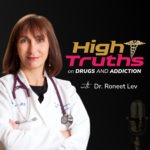
The brain in neuroplastic – it can be directed towards great achievement as well as disorders. Marijuana can cause synaptic reprogramming of the brain. Learn more from Dr. Kristen Gilliland who is a scientist who watched her own son’s synaptic programming that resulted in cannabis use disorder, and tragic death. She is now dedicated to science base education on drugs.

Kristen M. Gilliland, Ph.D.
Dr. Kristen Gilliland delivered a TEDx presentation titled Rewiring Revolution: Neuroplasticity’s Impact on Wellbeing in 2018.
She earned her Ph.D. in Organic Chemistry at the University of Colorado, Boulder. She later served as an Associate Professor of Chemistry at Cal Poly State University, San Luis Obispo. During her professorship at Cal Poly, she taught Organic Chemistry, Neurochemistry, and the Chemistry of Drugs and Poisons. After Kristen’s son was diagnosed with cannabis-induced schizophrenia at the age of 17, Kristen joined the Warren Center for Neuroscience Drug Discovery at Vanderbilt University (2018) to research new treatments for schizophrenia. Tragically, Kristen lost her son to an accidental overdose in 2019 after his mental health severely declined and he became addicted to opioids and stimulants. Kristen then changed the trajectory of her life to utilize her scientific teaching, presentation, and research skills to educate adolescent-aged children and their parents on mental health challenges and how it can lead to substance use and/or substance use disorder. As the Director of Outreach and Advocacy Programs for the Warren Center, Kristen presents to middle schools, high schools, community centers, and recovery programs across Middle Tennessee. In addition, she has developed an award winning educational documentary aimed for middle school and high school-aged children titled Speaking Through Me which will be released Summer of 2023. The documentary and Kristen’s presentations focus on the developing teenage brain and neuroplasticity, the structural and functional changes that occur in the brain when under repeated stress and anxiety, the impacts of high potency cannabis on the adolescent brain, the neurobiology of addiction, and the dangers and prevalence of fentanyl. Lastly, the documentary and presentations also include methods to combat everyday stressors or adversity and the importance of self-care and self-compassion on the developing adolescent brain.








